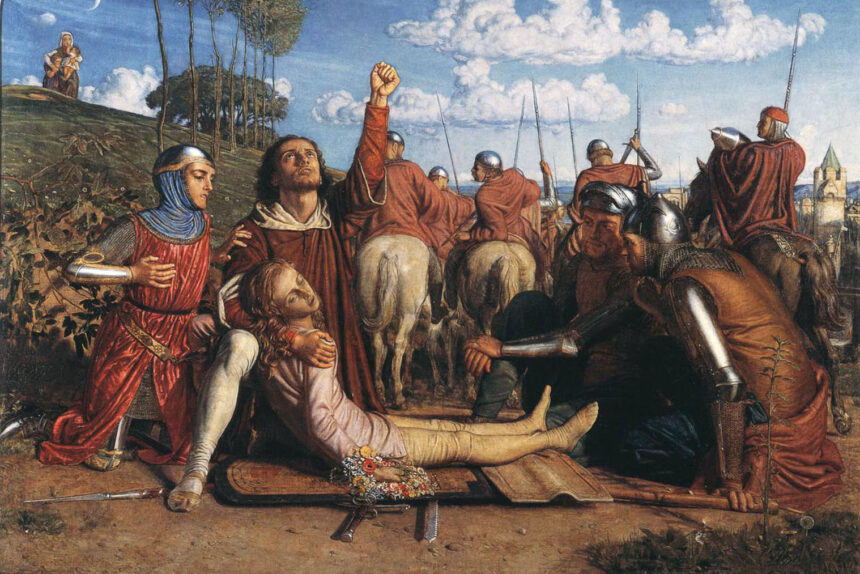Our foreign policy editor, Srdja Trifkovic, produced a provocative commentary questioning the description of Italians as a nation. Rather than being a nation, according to Prof. Trifkovic, Italy embraces a medley of Latin ethnicities who were unwisely forced into political union in the second half of the 19th century and who have stayed together with varying degrees of discomfort despite deep-seated regional differences.
One might cite in defense of this contention the changing ethnic identity among those of Italian extraction outside of Italy (all’estero). Their “Italianization” mostly occurred long after these emigrants left the Italian peninsula. The original settlers and their families, who came from relatively isolated peasant societies, long identified themselves as Abruzzesi, Siciliani, Napolitani, etc., depending on the part of Italy whence they emigrated. Moreover, these immigrants continued to speak in the dialects of their regions, consumed the corresponding cuisine (alla casalinga), and observed inherited regional customs. In the U.S. and Canada, those of Italian extraction sometimes discovered a specifically Italian ethnicity only after a generation as immigrants. In fact, they often came to view themselves as full-blooded Italians only when differentiating themselves from Protestant Americans and various other ethnic minorities.
Despite such examples, however, Italians do share a common past as a Latin people (with some Germanic and other admixtures) with a shared history of collective glory and collective misfortune. Historically, Italians have viewed themselves as the descendants of the Romans, a fact that Mussolini never tired of reminding his countrymen. Italian nationalism even marked the attempts to revive the Roman Empire centered in Italy, as we learn from Italy’s great medieval poets Dante and Petrarch. The 14th-century “Roman tribune” Cola di Rienzi, the subject of Wagner’s early opera and of the opera that the Italian patriot Verdi intended to produce, aimed at unifying il popolo italiano. Rienzi was concerned not only with ruling Rome but also with using the ancient Roman capital as a base to forge a specifically Italian political nation. A similar interest marks Machiavelli’s The Prince, whose effusive Italian patriotism receives particularly passionate expression in the last chapter.
“Il Canto degli Italiani,” Italy’s national anthem, written in 1847 by an Italian patriot, celebrates the Roman origins of the Italian people, who are now “awakening” from foreign captivity. These awakened Italians are, moreover, attaching to their very Italian heads the “helmet of Scipio,” seeing themselves as the descendants of the great Roman commander who defeated the Carthaginians. In this stirring anthem, “Italian brothers” are “slaves to Rome” because of the Roman identity that guides their national vision.
I’ve no idea how Prof. Trifkovic can view the Italians as less of a nation than his fellow Serbs, who lost their freedom to the Turks in 1459 and regained it in the early 19th century. Serbia first became a united kingdom in the early 13th century, but Latin Italy was already unified under the Romans, with a shared language (from which Italian is derived), 1500 years earlier. From at least the High Middle Ages on, Italian political and cultural leaders spoke of reunifying their country, which had been divided since the dissolution of the Roman Empire. Much of Italian literature from the 14th century on deals with the yearning for a free and unified Italy.
Although Serbs, Romanians, Italians, and Germans only achieved unification and independence in the 19th century, are they less fully developed nations than, say, England and France? I see no reason to believe that. The fact that Italians have showed persistent regional divisions does not detract from their nationhood. In Great Britain, the Celtic fringes are asserting independent identities. Spain, too, is riven by division among the Castilians, Catalans, and Basques. Would we deny the Spaniards, the Englishmen, or even the French the right to call themselves nations or nation-states because they contain disgruntled minorities? If not, why is Italy less of a people than these other nations?
The idea that nations must have a political framework to work out their national identities became prevalent in the 19th century, but before then, culture, language, and/or shared ethnic roots were viewed as the essential characteristics of nationhood. Italy was often cited, as in the work of the 18th-century writer on national identity, J. G. Herder, as an example of a linguistic and cultural nation that was still waiting to become a political one. Although political unification came late for the Italians, they most certainly were a nation before that time.
Let me close here with a memorable scene from the television series The Sopranos. Tony Soprano’s henchmen are hired by a Hasidic Jew who wants to get his quarrelsome son-in-law to grant a Rabbinic bill of divorce to an unhappily married daughter. The Italian mobsters then capture the son-in-law and try to force him into granting the divorce. Annoyed with his captors, the young man cries out: “We Jews are still around after thousands of years, but what happened to the Romans?” Those who have seized him, descendants of Southern Italian and Sicilian immigrants, look at each other in total bewilderment, and then one of them responds quite matter-of-factly: “Here we are!”

Leave a Reply